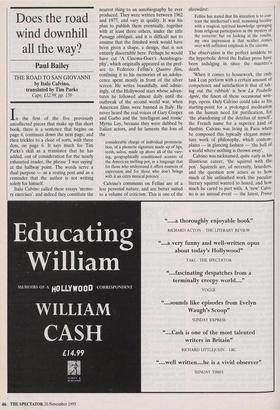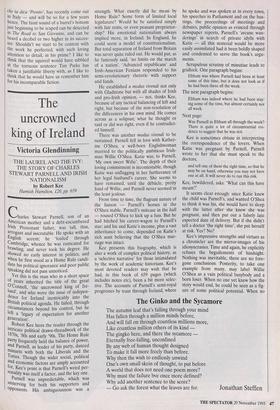Does the road wind downhill all the way?
Paul Bailey
THE ROAD TO SAN GIOVANNI by Italo Calvino, translated by Tim Parks
Cape, £12.99, pp. 150 In the first of the five previously uncollected pieces that make up this short book, there is a sentence that begins on page 4, continues down the next page, and then trickles to a close of sorts, with three dots, on page 6. It says much for Tim Parks's skill as a translator that he has added, out of consideration for the nearly exhausted reader, the phrase 'I was saying' at the halfway point. The words serve a dual purpose — as a resting post and as a reminder that the author is not writing solely for himself.
Italo Calvin() called these essays 'memo- ry exercises', and indeed they constitute the
nearest thing to an autobiography he ever produced. They were written between 1962 and 1977, and vary in quality. It was his plan to publish them eventually, together with at least three others, under the title Passaggi obbligati, and it is difficult not to assume that the finished work would have been given a shape, a design, that is not entirely discernible here. Perhaps he would have cut 'A Cinema-Goer's Autobiogra- phy', which originally appeared as the pref- ace to Federico Fellini's Quattro film, confining it to his memories of an adoles- cence spent mostly in front of the silver screen. He writes beautifully, and admir- ingly, of the Hollywood stars whose adven- tures he followed almost daily until the outbreak of the second world war, when American films were banned in Italy. He never heard the real voices of Gary Cooper and Garbo and the 'intelligent and ironic' Myrna Loy, because they were dubbed by Italian actors, and he laments the loss of the considerable charge of individual pronuncia- tion, of a phonetic signature made up of lips, teeth, saliva, made up above all of the vary- ing, geographically conditioned accents of the American melting-pot, in a language that for those who understand it offers nuances of expression and for those who don't brings with it an extra musical potency
Calvino's comments on Fellini are of a less personal nature, and are better suited to a volume of criticism. This is one of the shrewdest:
Fellini has stated that his intention is to con- trast the intellectual's arid, reasoning lucidity with a magical, spiritual knowledge springing from religious participation in the mystery of the universe: but on looking at the results, my own impression is that neither comes over with sufficient emphasis in the cinema.
The observation is the perfect antidote to the hyperbolic drivel the Italian press have been indulging in since the maestro's death.
`When it comes to housework, the only task I can perform with a certain amount of competence and satisfaction is that of tak- ing out the rubbish' is how La Poubelle Agree, the finest of these occasional writ- ings, opens. Only Calvino could take as his starting-point for a prolonged meditation on the human need for purification, for `the abandoning of the detritus of myself, the French name for a superior kind of dustbin. Calvin() was living in Paris when he composed this typically elegant minia- ture work of philosophy, which contem- plates — in glancing fashion — 'the hell of a world where nothing is thrown away'.
Calvino was nicknamed, quite early in his illustrious career, 'the squirrel with the pen'. Squirrels are, of necessity, hoarders, and the question now arises as to how much of his unfinished work this peculiar literary squirrel wanted to hoard, and how much he cared to part with. A 'new' Calvi- no is an annual event — the latest, Prima the to dica 'Pronto', has recently come out in Italy — and will be so for a few years hence. The faint sound of a barrel's bottom Just beginning to be scaped can be detected in The Road to San Giovanni, and can be heard a decibel or two higher in its succes- sor. Shouldn't we start to be content with the work he perfected, with such loving attention to detail, in his prime? I like to think that the squirrel would have nibbled at the tortuous sentence Tim Parks has taken a justifiable liberty with, as I like to think that he would have us remember him for his incomparable fiction.











































































 Previous page
Previous page